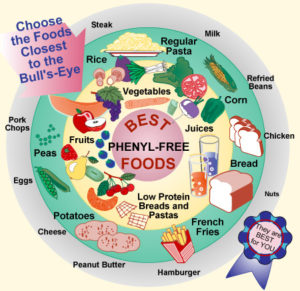Amino acids are organic compounds composed of nitrogen, carbon, hydrogen, oxygen and variable side chain groups. Amino Acids are referred to as the building blocks of protein that conduct many vital processes like syntheses of hormones and neurotransmitters. Your body needs 20 different amino acids to grow and function properly; 9 of those amino acids are referred to as essential amino acids and they can only be obtained through our diet. One essential amino acid is called phenylalanine…
Although they play a role in the main topic of this article, amino acids are not the main focus. This article was written to tell you about Phenylketonuria.
Phenylketonuria, aka PKU, is a rare disorder that causes phenylalanine to build up in the body. PKU is caused by a mutation in the PAH gene. Both parents must carry the defective gene to have a child with PKU; most of the time parents are not aware they have it. If only one parent has the defective gene, there is no risk of their child having Phenylketonuria, however they can be a carrier.
Phenylalanine builds up in the body of people with PKU because the enzyme needed to transform phenylalanine into tyrosine which is what your body uses to create neurotransmitters such as epinephrine, norepinephrine and dopamine.
Phenylketonuria is very rare in the United States. This condition affects about 1 in 10,000 to 15,000 newborns each year. Babies in the U.S. are screened by a blood test for PKU shortly after they are born. Early screening allows treatment to begin soon after birth and can help relieve symptoms and prevent brain damage.
Initially newborns with PKU do not show symptoms but without treatment babies usually develop symptoms within a few months.
There are 2 types of Phenylketonuria:
- Classic PKU is more severe. The enzyme needed to transform phenylalanine is absent or very low, resulting in high levels of phenylalanine and severe brain damage
- Mild PKU is caused when phenylalanine levels are less high because the enzyme needed to convert it still has some function. There is less brain damage in this instance.
PKU signs and symptoms can vary from mild to severe and may include:
- A musty or mouse-like odor to breath, skin or urine
- Neurological issues
- Eczema skin rashes
- Fair skin and eyes because phenylalanine can not transform into melanin
- Abnormally small head (microcephaly)
- Hyperactivity
- Intellectual disability
- Delayed development
- Behavioral, emotional and social problems
- Psychiatric disorders
When PKU goes untreated it can lead to:
- Irreversible brain damage and noticeable intellectual disability within the first few months of life.
- Neurological problems like seizures and tremors
- Behavioral, emotional and social problems in older children and adults
- Major health and developmental issues
It is important that women with PKU or women who carry the gene that causes it follow a low-phenylalanine diet before and during pregnancy in order to avoid complications. Women who have high blood phenylalanine levels can risk harming the fetus or suffering a miscarriage. Even women with less severe forms of PKU can be putting their unborn child at risk if they do not eat correctly.
Complications at birth in babies born to mothers with PKU are:
- Low birth weight
- Delayed development
- Facial abnormalities
- Abnormally small head
- Heart defects and other heart problems
- Intellectual disability
- Behavioral problems
 Phenylketonuria is treated with a Low-Phenylalanine Diet. Infants through adults with PKU need a formula made without phenylalanine in order to get proper nutrition. There are also certain low-protein, PKU-friendly foods that can be found in specialty health stores. Slow damage to the central nervous system can result from high phenylalanine levels in the blood of people with PKU. Phenylalanine and other essential amino acids are mainly found in Aspartame, an artificial sweetener, and in the following types of food:
Phenylketonuria is treated with a Low-Phenylalanine Diet. Infants through adults with PKU need a formula made without phenylalanine in order to get proper nutrition. There are also certain low-protein, PKU-friendly foods that can be found in specialty health stores. Slow damage to the central nervous system can result from high phenylalanine levels in the blood of people with PKU. Phenylalanine and other essential amino acids are mainly found in Aspartame, an artificial sweetener, and in the following types of food:
- Meat
- Seafood
- Poultry
- Eggs
- Dairy Products
- Grains like: soy, quinoa and buckwheat
- Beans and nuts
Each person with PKU is different so it is important that they work with a dietician to create an eating plan that provides the proper balance of nutrients while limiting their consumption of phenylalanine. It is important that people with Phenylketonuria keep a food journal so they can record the amount of phenylalanine foods they eat throughout the day.
The FDA approved a medication a few years ago called sapropterin (Kuvan) for the treatment of PKU. Not all people can take the drug; this is relative to each person. The people who can take it must follow a special PKU meal plan. It is most effective in children with mild cases of PKU.
Phenylketonuria cannot be prevented because it is a genetic disorder. When women who have Phenylketonuria want to become pregnant they should seek genetic counseling if they know about their condition or if they know they are a carrier of the gene that causes PKU. A geneticist can help the parents understand the risk and assist in family planning.
People with PKU cannot eat a steak or ice cream or cheese like the rest of us. They often may feel hungry because their diet is neither nutritious or filling. The diet for PKU is so restrictive that 70% of teens and adults living with this genetic disorder go off of it or avoid it. This is very dangerous and causes, at the very least, headaches, anxiety and poor cognitive function. It is important that people living with PKU learn to accept their condition and follow a strict diet and drink a prescription formula that doesn’t taste or smell good, to make sure they get enough of the amino acids they can process. It can be hard for kids in school as they grow because they can’t eat like the other kids and believe it or not, it can be hard on parents without PKU to let go of some expectations in diet but with honesty and care and proper food, people with PKU can live a full and happy life.
Exercise is a great way to help all of us feel happy, lower risk of chronic disease, strengthen muscles and bones, increase energy and sleep better. It has not been found that exercise reduces phenylalanine in people with PKU but it sure can increase the quality of life. People with PKU should talk to their dietician about nutrition changes for heavy workouts or if they desire to body build since they cannot drink the protein shakes that many of us use to recover from our intense workouts and amino acid supplements need to be monitored. But exercise can help keep blood sugar levels in control and that is important since PKU formulas, that are necessary 3 times per day, tend to be high in sugar content.
If you are needing help with a comprehensive wellness plan and workout routine please Contact Wellness Works NW so you can meet with Karen G Clemenson and get moving.
I hope this article answered questions you had and was easy to understand. If you would like us to write about a particular topic that you can’t find on this site, please send us an email on our Dear Jamie page and someone from Our Team will be glad to research and write about your topic.
Resources and Start Learning More:
- Ask the Dietician: Is Exercise Safe for People with PKU? by National PKU News Staff
- Essential Amino Acids: Definition, Benefits and Food Sources by Jillian Kuala, MS, RD for HealthLine
- For These Kids, Following This Diet is a Matter of Life or Brain Damage by Estelle Erasmus and medically reviewed by Karen Richardson Gill, MD, FAAP for HealthLine
- Phenylketonuria by Mayo Clinic Staff
- Phenylketonuria by U.S. National Library of Medicine Staff
- What is phenylketonuria? by Cindie Slightham and medically reviewed by Karen Richardson Gill, MD, FAAP for HealthLine
- What Is The Diet For PKU? by Cristine M. Trahms for the University of Washington
Related Articles
- Do You Need to Take Dietary Supplements?
- The Ketogenic Bible
- Fat Cells 200: How Our Bodies Use Fat
- Love Your Guts
- Wellness with Drug & Alcohol Addiction
I hope this article helps Fuel Your Wellness. Please leave your comments below.
~
 Summer D Clemenson is a co-owner Clemenson Enterprises, LLC and Wellness Works NW. Summer her wife, Karen G Clemenson’s personal motto is Creativity, Honesty & Positivity are a must! This mantra helps them stay community and wellness minded in all they do. Summer is an Independent Wellness Advocate at dōTERRA. Summer also writes poetry and inspirational blogs @ GoodTimesAlways.com. Her crochet art can be viewed and purchased @ KnottyWares.com & she loves special orders!
Summer D Clemenson is a co-owner Clemenson Enterprises, LLC and Wellness Works NW. Summer her wife, Karen G Clemenson’s personal motto is Creativity, Honesty & Positivity are a must! This mantra helps them stay community and wellness minded in all they do. Summer is an Independent Wellness Advocate at dōTERRA. Summer also writes poetry and inspirational blogs @ GoodTimesAlways.com. Her crochet art can be viewed and purchased @ KnottyWares.com & she loves special orders!



 Please wait...
Please wait...

